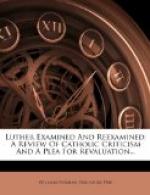The “imperious spirit” and “violent measures” charged against Luther a careful reader of history will rather find on the side of Luther’s opponents. They plainly relied on the power of Rome to crush Luther by brute force. What respect could a plain, honest man like Luther conceive for men like Cajetanus, Eck, and Hoogstraten, who were first sent by the Vatican to negotiate his surrender? For publishing simple Bible-truth the cardinal at Augsburg roared and bellowed at him, “Recant! Recant!” Even at this early stage of the affair matters assumed such an ominous aspect that Luther’s friends urged him to quietly leave the city. They did not trust the amicable gentleman from the polished circle of the Pope’s immediate counselors. At Leipzig, Eck had been driven into the corner by Luther’s unanswerable arguments from Scripture; then he turned to abuse and called Luther a Bohemian and a Hussite, and finally left the hall with the air of a victor to celebrate his achievement in the taverns and brothels of the city, where he found his customary delights learned from his masters at Rome. Can any language of contempt in which Luther afterwards spoke of this doughty champion of Rome be too strong? Among the attendants at the Leipzig Debate was Hoogstraten. This gentleman followed the elevating profession of torturing and burning heretics in Germany,—the territory especially assigned to him. It looked as if he had come to Leipzig to follow up Eck’s verbal thunder with the inquisitorial lightning, and make of Luther actually another Hus. When he found that he would not have an opportunity for plying his hideous trade this time, he ventured into territory where he was a stranger: he attempted a theological argument with Luther. He asserted that by denying the primacy of the Pope, Luther had contradicted the Scriptures and defied the Council of Nice, and must be suppressed. Luther called him an unsophisticated ass and a bloodthirsty enemy of the truth. Certainly, that does not sound nice, but such things happen, as a rule, when fools rush in where angels fear to tread.
What was the papal bull of excommunication against Luther, with its list of most opprobrious terms, but an unwarranted provocation of Luther, who had a right to expect different treatment from the foremost teacher of Christianity to whom he had entrusted his just grievance as a dutiful son of the Church? Thus we might go on for pages citing instances of reckless attack upon Luther, often by most unworthy persons, that drew from Luther a reply such as his assailants deserved.




